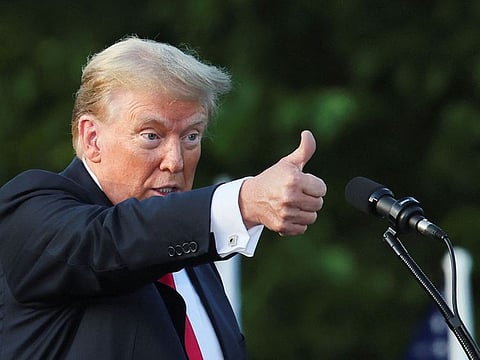Trump wants secret documents case paused after immunity ruling
It's the latest fallout from the Supreme Court's 6-3 decision on July 1

Donald Trump has asked to pause the federal prosecution over his alleged mishandling of classified information after the US Supreme Court ruled the former president was potentially immune from criminal charges related to official acts.
In a Friday court filing, Trump's lawyers asked US District Judge Aileen Cannon to set a schedule for the parties to fight over the significance of the Supreme Court's decision. They proposed deadlines extending into September and halting most of the rest of the case until she rules on immunity and a separate constitutional challenge to Special Counsel Jack Smith's appointment.
"Resolution of these threshold questions is necessary to minimize the adverse consequences to the institution of the Presidency arising from this unconstitutional investigation and prosecution," Trump's lawyers wrote.
It's the latest fallout from the Supreme Court's 6-3 decision on July 1 declaring Trump entitled to at least some protection against charges for official acts as president. The ruling came out of a separate case in Washington over his efforts to overturn the 2020 election results, but is expected to affect the other three prosecutions against him.
A Justice Department spokesperson did not immediately respond to a request for comment.
A state judge in Manhattan this week pushed back sentencing in the hush-money case against Trump from July 11 to Sept. 18. Trump's lawyers will argue that his conviction should be tossed out because the judge was wrong to allow evidence at trial related to actions Trump took while he was president.
The New York district attorney's office didn't oppose the delay but said Trump's position is "without merit."
In Washington, the election obstruction case hasn't formally been sent back to US District Judge Tanya Chutkan. Once that happens, she will set a schedule for written briefs and potentially a hearing on how much of the indictment can proceed to trial.
A state prosecution in Fulton County, Georgia, over the 2020 election is already paused amid a fight over Trump's effort to disqualify District Attorney Fani Willis. A Georgia appeals court is tentatively set to hear arguments in October. The Supreme Court's immunity decision is likely to come into play "- and delay a trial "- after the disqualification issue is fully litigated.
Trump is charged in Florida with illegally keeping documents containing sensitive national security information after he left the White House and of trying to obstruct the government's investigation into those materials.
The long-term schedule for the documents case already was in limbo. Cannon earlier this year canceled a May trial and indefinitely postponed setting a new date as she sorts through pretrial legal fights.
Trump's lawyers raised an immunity claim in February but Cannon didn't rule on the issue while it was before the Supreme Court.
The indictment focuses on Trump's possession of dozens of documents with classified markings starting the day he left office on Jan. 20, 2021. Trump's lawyers argue he should be immune from counts related to possessing classified documents because any decisions he made as president about what records to designate as personal and take with him were protected official acts.
The Justice Department countered that the Presidential Records Act "- the federal law governing the handling of a president's "personal" and "presidential" materials "- was irrelevant to the question of whether Trump illegally kept state secrets for years at his Mar-a-Lago estate.
Cannon rejected Trump's argument for dismissing charges under the Presidential Records Act, but left open the possibility of him pressing it as a defense at trial, over the government's objection.
The case is US v. Trump, 9:23-cr-80101, US District Court, Southern District of Florida (West Palm Beach).



